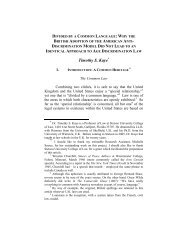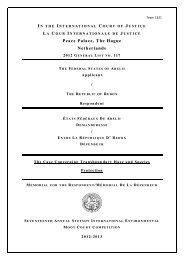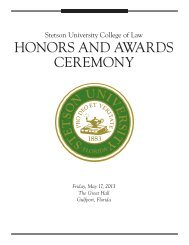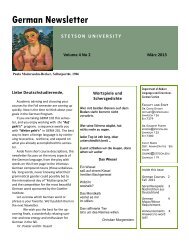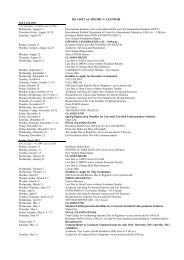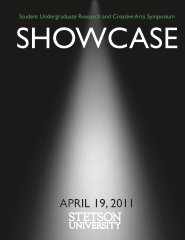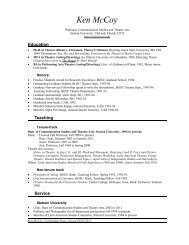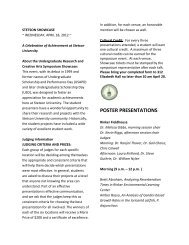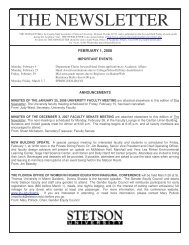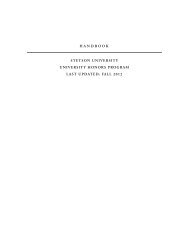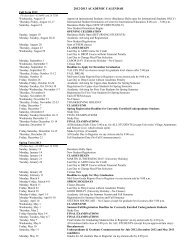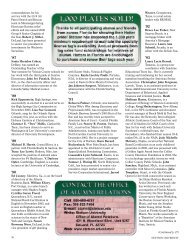Tiffany Huet Class of 2008 Justifying Violence: A ... - Stetson University
Tiffany Huet Class of 2008 Justifying Violence: A ... - Stetson University
Tiffany Huet Class of 2008 Justifying Violence: A ... - Stetson University
Create successful ePaper yourself
Turn your PDF publications into a flip-book with our unique Google optimized e-Paper software.
<strong>of</strong> eleven large U.S passenger airplanes over the Pacific Ocean in one momentous day in<br />
1995.” 79 He has written two declarations <strong>of</strong> jihad (1996 and 1998) instructing all Muslims to<br />
consider it their “individual duty” to attack the United States and its allies in any way possible,<br />
whether the attack be on military personnel or civilians. 80 The Qu’ran has traditionally been<br />
interpreted by ulama, or “learned authorities,” in order to provide agreements on the Shari’a or<br />
“the path that leads to happiness.” 81 The Shari’a is crucial to Islamic tradition and doctrine<br />
because it refers to the ideal way to live in order to achieve true earthly and heavenly<br />
fulfillment. 82 However, in the last 150 years, this very exclusive argument has become an<br />
increasingly public debate, one that bin Laden and other fundamentalist leaders have joined. 83<br />
The two sides that have formed are these: fundamentalists and pluralists. Fundamentalists<br />
(Osama bin Laden and his followers) believe that true justice is formed under an Islamic state<br />
that is devoted, “(a) to the establishment <strong>of</strong> Islam as the state religion, and (b) to the<br />
implementation <strong>of</strong> divine law, in the sense that policies are clearly derived from textual<br />
precedents.” On the contrary, pluralists believe that a just political system is one whose policies<br />
are simply “consistent with Islamic values,” and who is willing to look beyond the traditional<br />
understandings <strong>of</strong> the Qur’an. 84<br />
It is important that we compare and contrast bin Laden’s justification for violence with<br />
Bonhoeffer’s because <strong>of</strong> Bonhoeffer’s insistence that his ethic <strong>of</strong> deputyship was “a possibility<br />
79<br />
Juergensmeyer, 61, 70.<br />
80<br />
Kelsay, 29: Kelsay inserts an excerpt <strong>of</strong> bin Laden’s “Jihad Against Jews and Crusaders” in<br />
his article in Christian Century.<br />
81<br />
Kelsay, John. “Democratic Virtue, Comparative Ethics, and Contemporary Islam.” Journal <strong>of</strong><br />
Religious Ethics 33 no 4 (Dec. 2005): 699; Kelsay, “Bin Laden’s Reasons,” 27.<br />
82<br />
Kelsay, John. “Islam and the Problem <strong>of</strong> <strong>Violence</strong>,” in War or Words?: Interreligious<br />
Dialogue as an Instrument <strong>of</strong> Peace, ed. Donald W. Musser and D. Dixon Sutherland<br />
(Cleveland: The Pilgrim Press, 2005), 39.<br />
83<br />
Kelsay: “Democratic Virtue, Comparative Ethics, and Contemporary Islam,” 699.<br />
84<br />
Kelsay: “Democratic Virtue, Comparative Ethics, and Contemporary Islam,” 699.<br />
23



